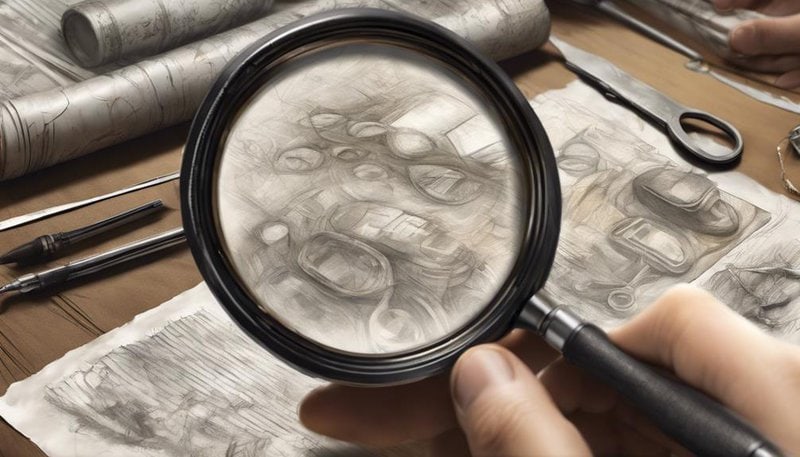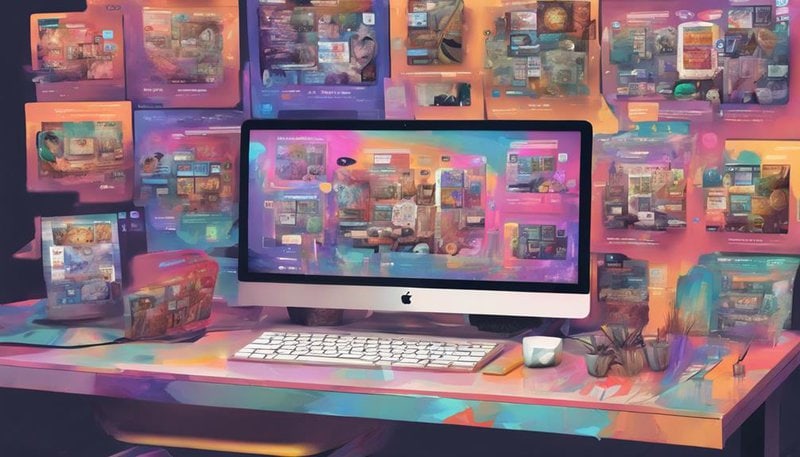How to Navigate NFT Marketplaces: A Beginner's Guide

Beginner's Guide to Navigating NFT Marketplaces:
Master the fundamentals of NFTs.
Set up a digital wallet.
Authenticate NFTs.
Understand costs.
Key Takeaways
- Research market trends and platforms for informed NFT marketplace decisions.
- Verify authenticity through blockchain records and creator validation.
- Engage in NFT communities for networking and collaboration opportunities.
- Safeguard NFT assets with secure storage, backups, and tailored insurance.
Understanding NFTs and Blockchain
Delving into the realm of NFTs and blockchain technology offers a gateway to understanding the future landscape of digital ownership and decentralized networks. At the heart of NFTs lies the concept of smart contracts, which are self-executing contracts with the terms of the agreement directly written into code. These smart contracts play a pivotal role in NFT ownership, as they ensure transparency, security, and irrevocable proof of ownership for digital assets.
When you acquire an NFT, you aren't just purchasing a digital file; you're securing a unique, non-fungible token that represents ownership of a specific asset. This ownership is authenticated and guaranteed by the underlying blockchain technology through the smart contract associated with the NFT. Understanding how smart contracts govern NFT ownership is essential for navigating the intricacies of digital ownership in the decentralized landscape.
Setting Up Your Digital Wallet
Setting up your digital wallet is a foundational step in your journey into the realm of NFTs and blockchain technology. Your wallet security and backup are paramount in safeguarding your digital assets. Remember, your private key protection and recovery are crucial aspects to consider when setting up your wallet. Here is a table to guide you through this essential process:
| Digital Wallet Setup | Instructions | Importance |
|---|---|---|
| Choose a Reputable Wallet Provider | Select a trusted platform that offers robust security measures. | Ensures the safety of your assets. |
| Backup Your Wallet | Create a secure backup of your wallet's private key or seed phrase. | Essential for recovery in case of loss or theft. |
| Enable Two-Factor Authentication | Add an extra layer of protection to your wallet login. | Enhances the security of your account. |
| Regularly Update Your Wallet | Keep your wallet software up to date to benefit from the latest security features. | Protects against potential vulnerabilities. |
Researching NFT Marketplaces

As you embark on your journey into the world of NFTs and blockchain technology, understanding how to research NFT marketplaces is a crucial step towards making informed decisions about your digital asset investments.
- Conduct thorough market research to grasp trends and pricing dynamics.
- Compare different platforms to find one that aligns with your needs and values.
- Explore artist collaborations to discover unique and exclusive NFT collections.
- Keep an eye out for limited editions that hold value and scarcity in the digital realm.
Deciding on Buying or Selling
Are you ready to make the decision on whether to buy or sell NFTs in the ever-evolving digital marketplace? When considering buying or selling NFTs, it's crucial to delve into pricing strategies and conduct thorough market analysis.
For those pondering buying NFTs, understanding pricing strategies is vital. Research the current market trends, evaluate the historical sales data of similar NFTs, and consider factors like rarity, demand, and the artist's reputation. This information can guide you in making informed decisions and potentially secure a good investment.
On the other hand, if you're contemplating selling NFTs, market analysis becomes your ally. Monitor the market fluctuations, identify peak selling times, and assess the demand for your particular NFT. By staying attuned to market dynamics, you can strategically time your sales for optimal returns.
Whether you're buying or selling, integrating pricing strategies and market analysis into your decision-making process can enhance your success in navigating the NFT marketplace.
Evaluating NFT Authenticity

To ascertain the authenticity of an NFT, scrutinize the blockchain records and verify the digital signature associated with the asset. When evaluating NFT authenticity, always remember the importance of verifying provenance and detecting forgeries.
Here are some essential steps to ensure the legitimacy of an NFT:
- Check the Blockchain Records: Examine the transaction history on the blockchain to confirm the origin and ownership of the NFT.
- Verify the Digital Signature: Confirm that the digital signature matches the creator's information to authenticate the NFT.
- Research the Creator: Investigate the background of the creator to validate their identity and reputation in the NFT community.
- Utilize Third-Party Verification Tools: Consider using reputable third-party services to cross-verify the authenticity of the NFT and detect any potential forgeries.
Engaging With NFT Communities
Engage with NFT communities by immersing yourself in their vibrant discussions and sharing your unique perspectives to foster meaningful connections within the digital art ecosystem. Community engagement is key in the world of NFTs, as it allows you to learn, grow, and collaborate with like-minded individuals. Building relationships within these communities can lead to exciting NFT collaborations and open doors to new opportunities. Participating in NFT events further enhances your presence and enables you to connect with artists, collectors, and enthusiasts who share your passion for digital art.
To help you better understand the importance of community engagement in the NFT space, take a look at the table below:
| Benefits of Community Engagement | Examples |
|---|---|
| Networking Opportunities | NFT Discord communities, Twitter NFT chats |
| Learning from Peers | NFT Clubhouse rooms, Virtual art exhibitions |
| Collaborative Projects | NFT artist collaborations, Blockchain art auctions |
Navigating Gas Fees and Costs

Immerse yourself in the world of NFTs by understanding how to navigate gas fees and costs efficiently to optimize your digital art transactions and investments. To help you navigate this aspect effectively, consider the following tips:
- Gas fee optimization: Dive into the details of gas fees to understand how they impact your transactions. Explore ways to reduce costs by choosing optimal transaction times or utilizing layer 2 solutions.
- Understanding gas fees: Familiarize yourself with the concept of gas fees and how they vary across different NFT marketplaces. Knowledge is power when it comes to making informed decisions.
- Cost-saving strategies: Implement smart strategies to minimize gas fees, such as bundling transactions whenever possible or consolidating multiple actions into a single transaction.
- Budgeting gas fees: Set a budget for gas fees to ensure you don't overspend during your NFT journey. Planning ahead can help you stay within your financial limits while engaging in the marketplace.
Safeguarding Your NFT Investments
Protecting your NFT investments requires more than just buying the digital assets; it entails safeguarding them with secure storage options and implementing risk mitigation strategies.
By exploring ways to securely store your NFTs and understanding how to minimize potential risks, you can protect your investments in the dynamic world of NFTs.
Secure Storage Options
To safeguard your NFT investments, exploring secure storage options is paramount for ensuring the longevity and protection of your digital assets. Here are some options to consider:
- Cold storage: Keeping your NFTs offline and away from potential online threats.
- Hardware wallets: Storing your NFTs on specialized hardware devices for added security.
- Encrypted USB drives: Safely storing your NFT data on encrypted USB drives to prevent unauthorized access.
- Paper wallets: Printing out the private keys of your NFTs and storing them in a secure physical location for an extra layer of protection.
Choose a storage option that aligns with your risk tolerance and provides peace of mind for your valuable NFT collection.
Risk Mitigation Strategies
As you fortify your NFT investments through secure storage measures, honing risk mitigation strategies becomes imperative for safeguarding the value and integrity of your digital assets.
Start by conducting thorough risk assessments to identify potential vulnerabilities in your NFT portfolio. Consider acquiring insurance tailored to the unique risks associated with NFT ownership to provide an added layer of protection.
Stay vigilant against fraud prevention tactics and scams prevalent in the NFT space by verifying the authenticity of sellers and platforms before making any transactions. Educate yourself continuously on emerging threats and best practices to shield your investments from malicious actors.
Exploring NFT Marketplace Trends

Amidst the rapidly evolving landscape of NFT marketplaces, a discerning eye can detect intriguing trends shaping the future of this digital art realm. As you delve into the world of NFTs, it's essential to stay attuned to the following marketplace trends:
- Increased NFT Marketplace Regulations: Keep an eye on how regulatory bodies are adapting to the fast-paced growth of NFTs, as this will impact the overall landscape of NFT trading.
- Growing Popularity of Fractionalized Ownership: Witness the rise of fractionalized NFT ownership, allowing individuals to own a share of high-value NFTs, making this market more accessible to a broader audience.
- Integration of Virtual Reality (VR) and Augmented Reality (AR) in NFTs: Explore how NFT artists are incorporating immersive technologies like VR and AR into their creations, enhancing the interactive experience for buyers.
- Rise of Environmental Consciousness: Witness a shift towards environmentally friendly blockchain networks like Tezos and Flow, addressing concerns about the carbon footprint of NFTs.
Stay informed and adapt to these trends to navigate the ever-evolving NFT marketplace successfully.
Tips for Successful NFT Transactions
When venturing into the realm of NFT transactions, remember to prioritize security by opting for trusted payment methods.
Ensuring the authenticity of the NFT you're eyeing is crucial for a successful transaction.
Keeping tabs on your transaction history can provide valuable insights and peace of mind throughout the process.
Secure Payment Methods
How can you ensure the security of your transactions when delving into the world of NFT marketplaces? Ensuring payment security and fraud prevention is paramount for successful NFT transactions. To safeguard your transactions, consider the following tips:
- Use Secure Payment Methods: Opt for reputable payment gateways that offer buyer protection.
- Verify Seller Reputation: Prioritize transactions with sellers who've positive feedback and a good track record.
- Leverage Secure Escrow Services: Utilize platforms with secure escrow services to protect your transactions.
- Double-Check Transaction Details: Before finalizing any deal, ensure all transaction details are accurate to prevent misunderstandings.
Verify NFT Authenticity
To ensure the authenticity of NFTs and facilitate successful transactions, scrutinizing the origin and provenance of digital assets is a crucial step in navigating the complexities of the marketplace. When engaging in the NFT verification process, authenticity should be your top priority. Utilizing trustworthy authentication methods ensures the legitimacy of the NFTs you are interested in. Here is a helpful table outlining some reliable methods for verifying NFT authenticity:
| Authentication Method | Description | Benefits |
|---|---|---|
| Blockchain Verification | Utilizes blockchain technology to confirm ownership and origin of NFTs. | Immutable proof of ownership. |
| Verified Platforms | Purchase NFTs from reputable marketplaces or artists' websites. | Reduced risk of encountering counterfeit NFTs. |
| Artist Verification | Directly verify the artist's involvement in creating and selling the NFT. | Establishes a direct connection to the artist and their work. |
Track Transaction History
Delve into the intricate web of NFT transactions, tracing the path of ownership to ensure a smooth and successful exchange in the digital realm. When tracking transaction history, remember these key points:
- Examine Past Ownership: Investigate the previous owners to understand the asset's journey.
- Verify Authenticity: Confirm the legitimacy of the NFT by reviewing its transaction history.
- Analyze Market Trends: Keep an eye on how the NFT has moved through different markets.
- Monitor Price Fluctuations: Stay informed about price changes to make informed decisions.
Frequently Asked Questions
Can NFTs Be Purchased Using Traditional Currency or Do I Need to Use Cryptocurrency?
You can buy NFTs using traditional currency through platforms that offer payment options like credit cards, bank transfers, and PayPal. Keep in mind that some marketplaces may have conversion fees for non-crypto purchases.
Are There Any Restrictions on Who Can Buy or Sell NFTs on Certain Marketplaces?
To buy or sell NFTs on various platforms, age restrictions may apply, requiring identity verification. Some marketplaces have geographic limitations, needing proof of residence. Upholding these rules ensures security and compliance within the NFT community.
How Do I Ensure That the NFT I Am Buying Is Not a Duplicate or Counterfeit?
To ensure the NFT you buy is authentic, verify its legitimacy through blockchain records, artist verification, and marketplace reputation. Avoid counterfeit purchases by researching the item, checking for proper certification, and purchasing from reputable sources.
Can I Transfer My NFTs Between Different Digital Wallets Easily?
Transferring NFTs between different wallets can be smooth if the platforms support it. Check for wallet compatibility before moving assets to ensure a seamless asset migration process. Choose wisely to safeguard your digital treasures.
What Are Some Common Mistakes to Avoid When Navigating NFT Marketplaces as a Beginner?
When navigating NFT marketplaces as a beginner, you should avoid scams by researching sellers and platforms. Understand authenticity by verifying the creator and checking the history of the NFT. Make informed decisions to protect your investments.








